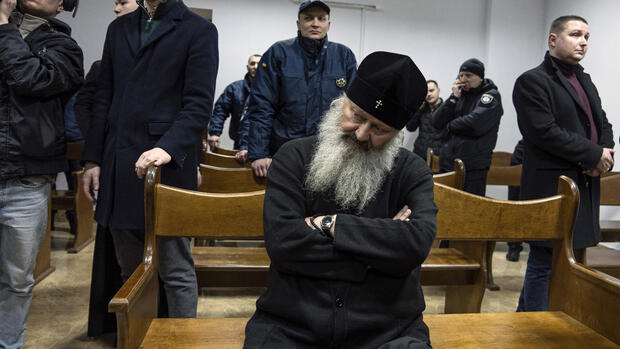Vienna On a normal day, the Lavra Cave Monastery in Kiev is a quiet place. In addition to black-clad monks and believers, at most a few tourists stray onto the extensive grounds of this Unesco World Heritage Site.
But recently, in this cradle of East Slavic Orthodoxy, there have been loud protests from various groups. The “Ukrainian Orthodox Church of the Moscow Patriarchate” is considered an ally of the Kremlin. Some Ukrainians are therefore calling for the monks to be expelled from Ukraine, while others want to prevent exactly that.
The reason was a search by the secret service SBU. The security forces took action against the controversial monastery leader, Abbot Pawel. He is accused of “fomenting interfaith hostility” and “justifying Russia’s aggression”. Then a court in Kiev put him under house arrest for 60 days.
He has to serve this outside the monastery because the authorities consider the presence of his church in the cave monastery to be illegitimate. They ended the lease for the upper part, which belongs to a state open-air museum, at the end of last year.
The church has controlled the lower part for 35 years. But legally she is a tenant without paying. The state terminated this contract at the end of March.
Pawel and his clergy consider the decision politically motivated and refuse to leave the premises. The Ukrainian state has so far refrained from using force to enforce the expulsion in order not to fuel allegations of religious persecution.
Controversial religious center in the middle of the capital.
(Photo: imago/Panthermedia)
Legally, the procedure is also on rather weak footing. If the procedure goes the correct way through the notoriously overburdened courts, the monks can calculate that they can stay on the site for years to come.
Hardly anyone in Ukraine disputes the fact that this is a highly political issue: it’s about whether the country will allow a church to remain, which only cautiously distanced itself from its patrons in Moscow under the impression of Vladimir Putin’s attack last year has, wants to tolerate in the symbolic center of the capital.
>> Read here: Poland promises further help to Selenski during his state visit
In 2018, then-Ukrainian President Petro Poroshenko founded an alternative church for Ukrainian Christians. In addition to the “Ukrainian Orthodox Church of the Moscow Patriarchate” there is now also the “Orthodox Church of Ukraine”, which is close to the government in Kiev. She would like to take over the site of the cave monastery
Poroshenko’s successor, Volodymyr Zelenskiy, now wants to have the Kremlin-affiliated church banned. He imposed sanctions on leading churchmen.
Louis Vuitton and Patek Philippe
One of them is Abbot Pavel, who is considered by many Ukrainians to be the epitome of all the evils of the Moscow patriarchate: for years he basked in the splendor of Putin, who awarded him a medal. When Pawel appeared at the weekend to protest the deportation, he was not only wearing a Louis Vuitton scarf, but also a Patek Philippe watch worth almost 40,000 euros.
In a telephone conversation published by the SBU, the abbot expressed his delight at the occupation of Cherson and described the attack on Ukraine as a “war between America and Russia to the last Ukrainian”.
>> Read here: Church and war: Christians complain about repressions under Selenski
However, not all representatives of the Ukrainian Orthodox Church of the Moscow Patriarchate are as hated as Pavel. And many Ukrainians still feel they belong to the church. It remains relevant, especially in the east of the country.
In January 2023, the church founded by Poroshenko was able to use the monastery for a Christmas mass for the first time.
(Photo: dpa)
Taking action against the Church too harshly therefore also harbors the risk of driving certain sections of the population towards Russia. Despite the war and political pressure, believers have not yet en masse converted to the Ukrainian Orthodox Church founded by Poroshenko.
The culture minister has hinted in the past that removing Pawel from the leadership of the cave monastery could represent a compromise that could prevent expulsion of the entire church.
It would be a face-saving way out of a situation where both sides have a lot to lose. However, the Ukrainian government has not yet been able to bring itself to do so.
More: Destroyed, looted, Russified: How war affects Ukrainian cultural assets.
